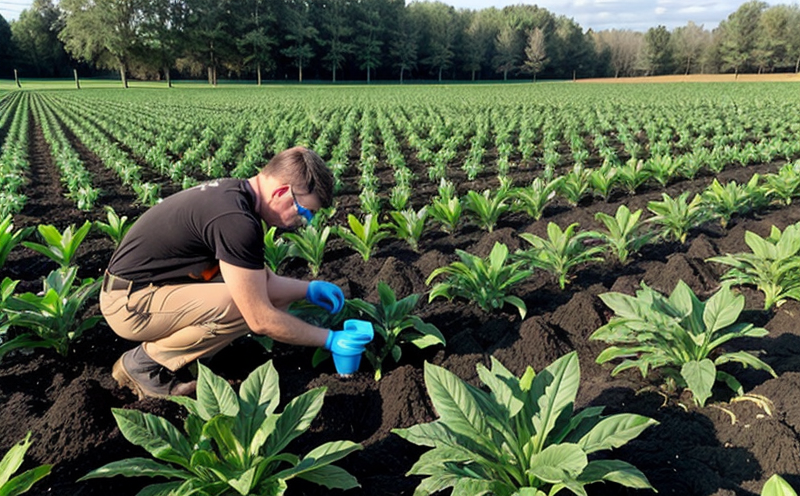Fertilizer Purity Testing
The importance of fertilizer purity testing cannot be overstated in agricultural and forestry sectors. High-quality fertilizers are crucial for achieving optimal crop yields and sustainable land use practices. Our laboratory offers comprehensive fertilizer purity testing services that ensure the integrity and effectiveness of your products.
Fertilizer purity refers to the degree to which a fertilizer contains its intended active ingredients without contamination from impurities or other substances. This quality is critical, as even small amounts of contaminants can significantly impact crop growth and soil health. Our laboratory uses advanced analytical techniques to provide precise measurements that meet global standards such as ISO, ASTM, EN, IEC, etc.
Our testing process involves several key steps: sample preparation, analysis using various instruments like atomic absorption spectrometry (AAS), inductively coupled plasma mass spectroscopy (ICP-MS), and gas chromatography-mass spectrometry (GC-MS). These methods help us identify trace elements and impurities that may affect the performance of fertilizers.
Once testing is complete, we produce a detailed report outlining all detected components including nitrogen, phosphorus, potassium, as well as any other relevant nutrients or contaminants. This information allows you to make informed decisions about your product development or quality assurance processes.
| Component | Test Method | Expected Range |
|---|---|---|
| Nitrogen (N) | Isothermal Microbalance Analysis | 10% - 35% |
| Phosphorus (P) | Inductively Coupled Plasma Optical Emission Spectroscopy | 5% - 20% |
| Potassium (K) | X-ray Fluorescence Spectrometry | 10% - 30% |
| Sulfur (S) | Molecular Absorption Spectroscopy | 2% - 8% |
| Zinc (Zn) | Inductively Coupled Plasma Mass Spectrometry | 0.1% - 1% |
We also offer custom testing packages tailored to specific customer needs, ensuring that every batch of fertilizer undergoes thorough evaluation. Our team of experts is dedicated to providing accurate results and actionable insights so you can maintain compliance with international standards while delivering superior quality products.
Understanding the purity levels in fertilizers helps prevent issues such as nutrient imbalances which could lead to poor plant health or reduced yields. By investing in our services, you ensure that your agricultural inputs meet stringent requirements set by regulatory bodies worldwide.
Industry Applications
- Agricultural production
- Farm management practices
- Sustainable land use strategies
- Crop nutrition optimization
In the agricultural sector, fertilizer purity testing plays a vital role in ensuring efficient crop growth and sustainable farming practices. Farmers rely on accurate data about their fertilizers' composition to apply appropriate amounts of nutrients, thereby reducing waste and promoting environmental stewardship.
| Industry | Purity Testing Needs | Outcome Benefits |
|---|---|---|
| Farms | Detect impurities that may inhibit plant growth | Enhanced crop yield and healthier plants |
| Government Agencies | Ensure compliance with national standards for fertilizer content | Supports regulatory requirements and public health protection measures |
| Farmers Co-ops | Monitor consistency across batches of purchased fertilizers | Promotes trust among members and supports cooperative goals |
| Agricultural Research Stations | Evaluate new formulations for potential issues before market release | Paves the way for innovation in crop nutrition science |
For forestry applications, maintaining the purity of fertilizers used can help improve forest health and productivity. Properly balanced nutrients contribute to robust tree growth and resilience against pests and diseases.
Quality and Reliability Assurance
- Accurate measurement techniques
- International standard compliance
- Consistent results across multiple samples
- Comprehensive reporting
To ensure the highest level of quality and reliability, our laboratory adheres to strict protocols throughout each stage of the testing process. From sample collection through final analysis and report generation, every step is designed to produce reliable outcomes.
We employ state-of-the-art instrumentation that follows internationally recognized standards such as ISO 17025 for calibration, ASTM D3699-04(2016) for soil testing methods, EN ISO/IEC 17025:2017 for general requirements for the competence of testing and calibration laboratories. This ensures that our results are consistent and repeatable.
Our team consists of highly trained professionals who understand both theoretical aspects of fertilizer analysis as well as practical challenges faced by industry stakeholders like yourselves. By leveraging this expertise, we can provide tailored solutions to meet your unique requirements.





